RS Aggarwal Solutions: Decimals (Exercise 3D) | Mathematics (Maths) Class 7 PDF Download
Q.1. Divide:
(i) 131.6 by 10
(ii) 32.56 by 10
(iii) 4.38 by 10
(iv) 0.34 by 10
(v) 0.08 by 10
(vi) 0.062 by 10
Ans. We have the following:
(i) 131.6 ÷ 10 = 131.610=13.16131.610=13.16 [Shift the decimal point to the left by 1 place]
(ii) 32.56 ÷ 10 = 32.5610=3.25632.5610=3.256 [Shift the decimal point to the left by 1 place]
(iii) 4.38 ÷ 10 = 4.3810=0.4384.3810=0.438 [Shift the decimal point to the left by 1 place]
(iv) 0.34 ÷ 10 = 0.3410=0.0340.3410=0.034 [Shift the decimal point to the left by 1 place]
(v) 0.08 ÷ 10 = 0.0810=0.0080.0810=0.008 [Shift the decimal point to the left by 1 place]
(vi) 0.062 ÷ 10 = 0.06210=0.00620.06210=0.0062 [Shift the decimal point to the left by 1 place]
Q.2. Divide:
(i) 137.2 by 100
(ii) 23.4 by 100
(iii) 4.7 by 100
(iv) 0.3 by 100
(v) 0.58 by 100
(vi) 0.02 by 100
Ans. We have the following:
(i) 137.2 ÷ 100 = 137.2100=1.372137.2100=1.372 [Shifting the decimal point to the left by 2 places]
(ii) 23.4 ÷ 100 =23.4100=0.23423.4100=0.234 [Shifting the decimal point to the left by 2 places]
(iii) 4.7 ÷ 100 = 4.7100=0.0474.7100=0.047 [Shifting the decimal point to the left by 2 places]
(iv) 0.3 ÷ 100 = 0.3100=0.0030.3100=0.003 [Shifting the decimal point to the left by 2 places]
(v) 0.58 ÷ 100 = 0.58100=0.00580.58100=0.0058 [Shifting the decimal point to the left by 2 places]
(vi) 0.02 ÷ 100 = 0.02100=0.00020.02100=0.0002 [Shifting the decimal point to the left by 2 places]
Q.3. Divide:
(i) 1286.5 by 1000
(ii) 354.16 by 1000
(iii) 38.9 by 1000
(iv) 4.6 by 1000
(v) 0.8 by 1000
(vi) 2 by 1000
Ans. We have the following:
(i) 1286.5 ÷ 1000 = 1286.51000=1.28651286.51000=1.2865 [Shift the decimal point to the left by 3 places]
(ii) 354.16 ÷ 1000 = 354.161000=0.35416354.161000=0.35416 [Shift the decimal point to the left by 3 places]
(iii) 38.9 ÷ 1000 = 38.91000=0.038938.91000=0.0389 [Shift the decimal point to the left by 3 places]
(iv) 4.6 ÷ 1000 = 4.61000=0.00464.61000=0.0046 [Shift the decimal point to the left by 3 places]
(v) 0.8 ÷ 1000 = 0.81000=0.00080.81000=0.0008 [Shift the decimal point to the left by 3 places]
(vi) 2 ÷ 1000 = 21000=0.00221000=0.002 [Shift the decimal point to the left by 3 places]
Q.4. Divide:
(i) 12 by 8
(ii) 63 by 15
(iii) 47 by 20
(iv) 101 by 25
(v) 31 by 40
(vi) 11 by 16
Ans. (i) 12 ÷ 8 = 12/8=3/2
∴ 12 ÷ 8 = 1.5
(ii) 63 ÷ 15 = 63/15=21/5
∴ 63 ÷ 15 = 4.2
(iii) 47 ÷ 20 = 47/20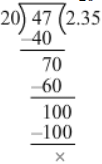
∴ 47 ÷ 20 = 2.35
(iv) 101 ÷ 25 = 101/25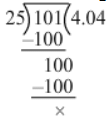
∴ 101 ÷ 25 = 4.04
(v ) 31 ÷ 40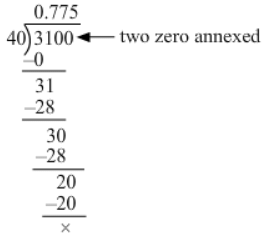
∴ 31 ÷ 40 = 0.775
(vi) 11 ÷ 16 = 11/16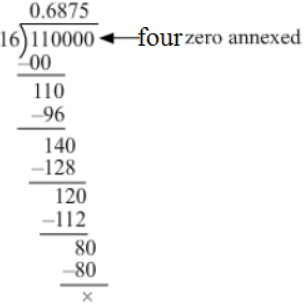
∴ 11 ÷ 16 = 0.6875
Q.5. Divide:
(i) 43.2 by 6
(ii) 60.48 by 12
(iii) 117.6 by 21
(iv) 217.44 by 18
(v) 2.575 by 25
(vi) 6.08 by 8
(vii) 0.765 by 9
(viii) 0.768 by 16
(ix) 0.175 by 25
(x) 0.3322 by 11
(xi) 2.13 by 15
(xii) 6.54 by 12
(xiii) 5.52 by 16
(xiv) 1.001 by 14
(xv) 0.477 by 18
Ans. (i) We have:
43.2 ÷ 6
∴ 43.2 ÷ 6 = 7.2
(ii) We have:
60.48 ÷ 12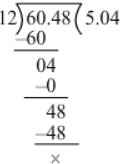
∴ 60.48 ÷ 12 = 5.04
(iii) We have:
117.6 ÷ 21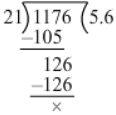
∴ 117.6 ÷ 21 = 5.6
(iv) We have:
217.44 ÷ 18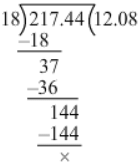
∴ 217.44 ÷ 18 = 12.08
(v) We have:
2.575 ÷ 25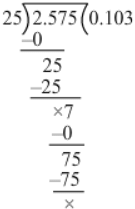
∴ 2.575 ÷ 25 = 0.103
(vi) We have:
6.08 ÷ 8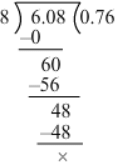
∴ 6.08 ÷ 8 = 0.76
(vii) We have:
0.765 ÷ 9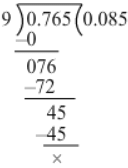
∴ 0.765 ÷ 9 = 0.085
(viii) We have:
0.768 ÷ 16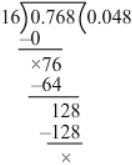
∴ 0.768 ÷ 16 = 0.048
(ix) We have:
0.175 ÷ 25
= 0.175/25
= (0.175×1000) / (25×1000)
= 175 / (25×1000)
= 7/1000
=0.007
(x) We have: 0.3322 ÷ 11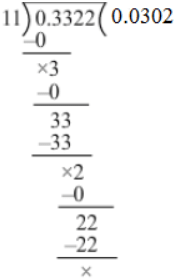
∴ 0.3322 ÷ 11 = 0.0302
(xi) We have:
2.13 ÷ 15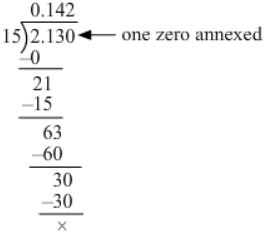
∴ 2.13 ÷ 15 = 0.142
(xii) We have:
6.54 ÷ 12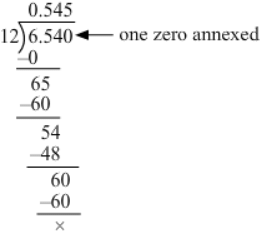
∴ 6.54 ÷ 12 = 0.545
(xiii) We have:
5.52 ÷ 16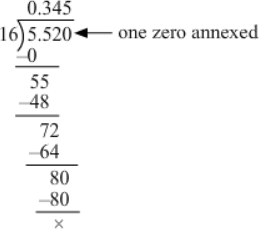
∴ 5.52 ÷ 16 = 0.345
(xiv) We have:
1.001 ÷ 14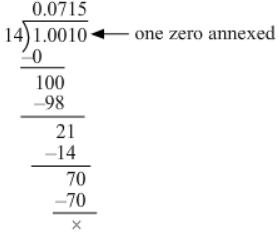
∴ 1.001 ÷ 14 = 0.0715
(xv) We have:
0.477 ÷ 18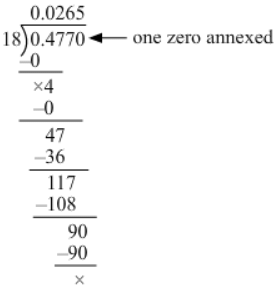
∴ 0.477 ÷ 18 = 0.0265
Q.6. Divide:
(i) 16.46 ÷ 20
(ii) 403.8 ÷ 30
(iii) 19.2 ÷ 80
(iv) 156.8 ÷ 200
(v) 12.8 ÷ 500
(vi) 18.08 ÷ 400
Ans. (i) 16.46 ÷ 20
= 16.46/20
= (16.46 × 100) / (20×100)
= 1646 / (2×1000)
= 823 / 1000
= 0.823
(ii) 403.8 ÷ 30 = 403.8 / 30
= (403.8×10) / (30×10)
= 4038 / (3×100)
=1346 / 100
=13.46
(iii) 19.2 ÷ 80
= 19.2/80
= 19.2×10/80×10
= 192/800
= 192/8×100
= 24/100
= 0.24
(iv) 156.8 ÷ 200
= 156.8/200
=156.8×10/200×10
=1568/2000
=784/1000
=0.784
(v) 12.8 ÷ 500
= 12.8/500
= (12.8×10) / (500×10)
= 128/5000
= 25.6/1000
= 0.0256
(vi) 18.08 ÷ 400
= 18.08/400
= 18.08×100 / 400×100
= 1808/40000
= 452/10000
=0.0452
Q.7. Divide:
(i) 3.28 by 0.8
(ii) 0.288 by 0.9
(iii) 25.395 by 1.5
(iv) 2.0484 by 0.18
(v) 0.228 by 0.38
(vi) 0.8085 by 0.35
(vii) 21.976 by 1.64
(viii) 11.04 by 1.6
(ix) 6.612 by 11.6
(x) 0.076 by 0.19
(xi) 148 by 0.074
(xii) 16.578 by 5.4
(xiii) 28 by 0.56
(xiv) 204 by 0.17
(xv) 3 by 80
Ans. (i) 3.28 ÷ 0.8
= 3.28/0.8
= (3.28×10) / (0.8×10)
= 32.8/8
Now, we have: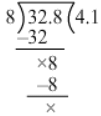
∴ 3.280.8=32.88=4.13.280.8=32.88=4.1
(ii) 0.288 ÷ 0.9
= 0.288/0.9
= (0.288×10) / (0.9×10)
= 2.88/9
Now, we have: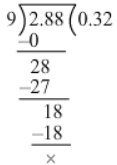
∴ 0.2880.9=2.889=0.320.2880.9=2.889=0.32
(iii) 25.395 ÷ 1.5
= 25.395 / 1.5
= (25.395×10) / (1.5×10)
= 253.95/15
Now, we have: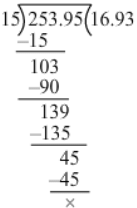
∴ 25.395/1.5
= 253.95/15
= 16.93
(iv) 2.0484 ÷ 0.18
= 2.0484/0.18
= (2.0484×100) / (0.18×100)
= 204.84/18
Now, we have: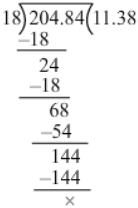
∴ 2.0484/0.18
= 204.84/18
= 11.382.04840.18=204.8418=11.38
(v) 0.228 ÷ 0.38
= 0.228/0.38
= (0.228×100) / (0.38×100)
= 22.8/38
Now, we have: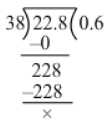
∴ 0.2280.38=22.838=0.60.2280.38=22.838=0.6
(vi) 0.8085 ÷ 0.35
= 0.8085/0.35
= (0.8085×100) / (0.35×100)
= 80.85/35
Now, we have: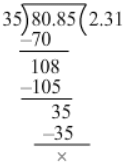
∴0.80850.35=80.8535=2.310.80850.35=80.8535=2.31
(vii) 21.976 ÷ 1.64 = 21.976/1.64
= (21.976×100) / (1.64×100)
= 2197.6/164
Now, we have: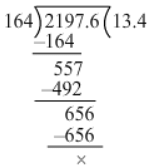
∴ 21.9761.64=2197.6164=13.421.9761.64=2197.6164=13.4
(viii) 11.04 ÷ 1.6
= 11.04/1.6
= (11.04×10) / (1.6×10)
= 110.4/16
Now, we have: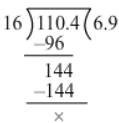
∴11.04/1.6
= 110.4/16
= 6.9
(ix) 6.612 ÷ 11.6
= 6.612/11.6
= (6.612×10) / (11.6×10)
= 66.12/1166
Now, we have: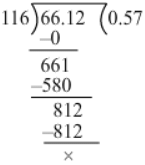
∴ 6.612/11.6
= 66.12/116
= 0.57
(x) 0.076 ÷ 0.19
= 0.076/0.19
= (0.076×100) / (0.19×100)
= 7.6/19
Now, we have: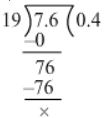
∴ 0.076/0.19
= 7.6/19
= 0.4
(xi) 48 ÷ 0.074
= 148/0.074
= 148×1000/0.074×1000
= 148000/74
= 2×1000
=2000
(xii) 16.578 ÷ 5.4
= 16.578/5.4
= (16.578×10)/(5.4×10)
= 165.78/54
Now, we have: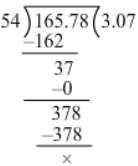
∴ 16.578/5.4
= 165.78/54
= 3.07
(xiii) 28 ÷ 0.56
= 28/0.56
= (28×100) / (0.56×100)
= 2800/56
= 1×100/2
= 50
(xiv) 204 ÷ 0.17
= 2040.17
= (204×100) / (0.17×100)
= 20400/17
= 12×100
= 1200
(xv) 3 ÷ 80 = 3/80
Now, we have: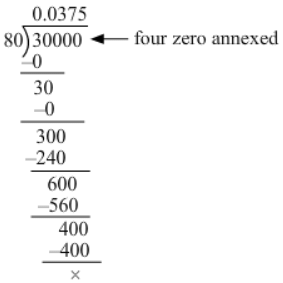
∴ 380380 = 0.0375
Q.8. The total cost of 24 chairs is Rs 9255.60. Find the cost of each chair.
Ans. Cost of 24 chairs = Rs 9255.60
∴ Cost of one chair = Rs (9255.60/24)
= Rs (9255.60×10) / (24×10)
= Rs (92556/240)
= Rs 385.65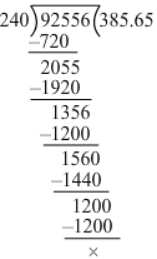
Hence, the cost of one chair is Rs 385.65.
Q.9. 1.8 m of cloth is required for a shirt. How many such shirts can be made from a piece of cloth 45 m long?
Ans. Cloth required for 1 shirt = 1.8 m
∴ Number of shirts that can be made from 45 m of cloth
= 45/1.8
=15/0.6
=5/0.2
= 50/2
= 25
Hence, 25 shirts can be made from a piece of cloth of length 45 m.
Q.10. A car covers a distance of 22.8 km in 2.4 litres of petrol. How much distance will it cover in 1 litre of petrol?
Ans. Distance covered by the car with 2.4 litres of petrol = 22.8 km
∴ Distance covered with 1 litre of petrol = (22.8/2.4) km
= (228/24) km
= (228÷12) / (24÷12) km
= (19/2) km
= km
km
Hence, the distance covered by the car with 1 litre of petrol is 912912 km.
Q.11. A tin holds 16.5 litres of oil. How many such tins will be required to hold 478.5 litres of oil?
Ans. Capacity of 1 tin of oil = 16.5 litres
∴ Number of tins required to hold 478.5 litres of oil = (478.516.5)=(4785165)=(4785÷15165÷15)=31911=29478.516.5=4785165=4785÷15165÷15=31911=29
Hence, 29 oil tins will be required to hold 478.5 litres of oil.
Q.12. The weight of 37 bags of sugar is 3644.5 kg. If all the bags weigh equally, what is the weight of each bag?
Ans. Weight of 37 bags of sugar = 3644.5 kg
∴ Weight of 1 bag of sugar = (3644.5/37)
= 98.5 kg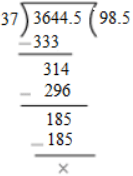
Hence, each bag of sugar weighs 98.5 kg.
Q.13. If 69 buckets of equal capacity can be filled with 586.5 litres of water, what is the capacity of eacch bucket?
Ans. Capacity of 69 buckets of water = 586.5 litres
∴ Capacity of one such bucket = (586.5/69) litres = 8.5 litres.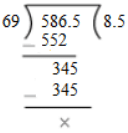
Hence, the capacity of each water bucket is 8.5 litres.
Q.14. Monica cuts 46 m of cloth into peices of 1.15 m each. How many pieces does she get?
Ans. Length of one piece of cloth = 1.15 m
∴ Number of pieces she gets from 46 m of cloth = (46/1.15)
= (46×100) / (1.15×100) = (4600/115) = 40
Hence, Monica has 40 pieces of cloth each of length 1.15 m.
Q.15. Mr Soni bought some bags of cement, each weighing 49.8 kg. If the total weight of all the bags is 1792.8 kg, how many bags did he buy?
Ans. Total weight of all the bags of cement = 1792.8 kg
Weight of each bag = 49.8 kg
Number of bags = (Total weight/Weight of each bag)
= (1792.8/49.8)
= (17928/498)
=36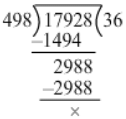
Hence, Mr. Soni bought 36 bags of cement.
Q.16. How many pieces of plywood, each 0.35 cm thick, are required to make a pile 1.89 m high?
Ans. Thickness of the pile of plywood pieces = 1.89 m = 189 cm
Thickness of one piece of plywood = 0.35 cm
∴ Required number of plywood pieces = (189/0.35)
=(189×100) / (0.35×100)
= (18900/35)
= 540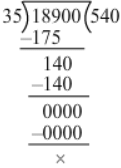
Hence, 540 pieces of plywood are required to make a pile of height 1.89 m.
Q.17. The product of two decimals is 261.36. If one of them is 17.6, find the other.
Ans. Product of the given decimals = 261.36
One decimal = 17.6
The other decimal = 261.36 ÷ 17.6
= (261.36/17.6)
= (261.36×10) / (17.6×10)
=(2613.6/176)
= 14.85
Hence, the other decimal is 14.85.
|
76 videos|344 docs|39 tests
|
FAQs on RS Aggarwal Solutions: Decimals (Exercise 3D) - Mathematics (Maths) Class 7
| 1. What are the different types of decimal numbers? |  |
| 2. How can I convert a decimal number into a fraction? |  |
| 3. What is the significance of place value in decimal numbers? |  |
| 4. How can I compare decimal numbers? |  |
| 5. How can I add and subtract decimal numbers? |  |


















